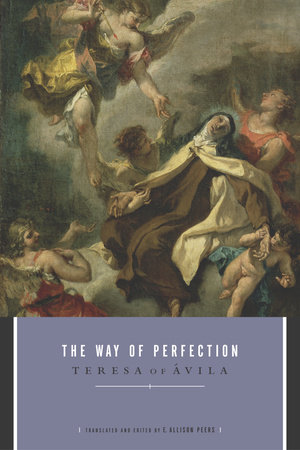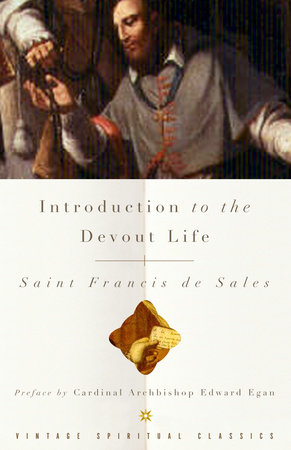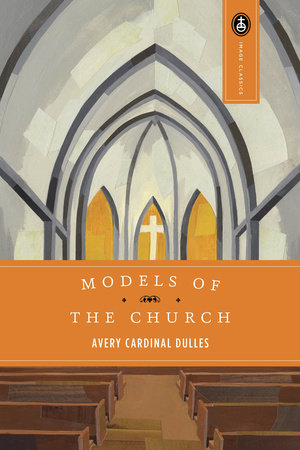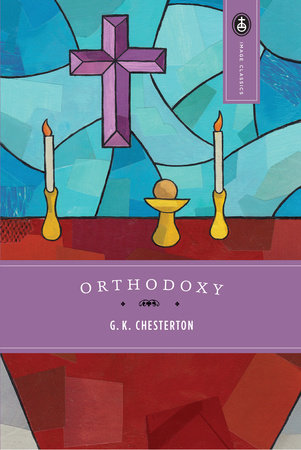Excerpt
The Way of Perfection
Chapter I
Of the reason which moved me to found this convent in such strict observance.
When this convent1 was originally founded, for the reasons set down in the book which, as I say, I have already written, and also because of certain wonderful revelations by which the Lord showed me how well He would be served in this house, it was not my intention that there should be so much austerity in external matters, nor that it should have no regular income: on the contrary, I should have liked there to be no possibility of want. I acted, in short, like the weak and wretched woman that I am, although I did so with good intentions and not out of consideration for my own comfort.
At about this time there came to my notice the harm and havoc that were being wrought in France by these Lutherans and the way in which their unhappy sect was increasing.2 This troubled me very much,3 and, as though I could do anything, or be of any help in the matter, I wept before the Lord and entreated Him to remedy this great evil. I felt that I would have laid down a thousand lives to save a single one of all the souls that were being lost there. And, seeing that I was a woman, and a sinner,4 and incapable of doing all I should like in the Lord's service, and as my whole yearning was, and still is, that, as He has so many enemies and so few friends, these last should be trusty ones, I determined to do the little that was in me--namely, to follow the evangelical counsels as perfectly as I could, and to see that these few nuns who are here should do the same, confiding in the great goodness of God, Who never fails to help those who resolve to forsake everything for His sake. As they are all that I have ever painted them5 as being in my desires, I hoped that their virtues would more than counteract my defects, and I should thus be able to give the Lord some pleasure, and all of us, by busying ourselves in prayer for those who are defenders of the Church, and for the preachers and learned men who defend her, should do everything we could to aid this Lord of mine Who is so much oppressed by those to whom He has shown so much good that it seems as though these traitors6 would send Him to the Cross again and that He would have nowhere to lay His head.
Oh, my Redeemer, my heart cannot conceive this without being sorely distressed! What has become of Christians now? Must those who owe Thee most always be those who distress Thee?7 Those to whom Thou doest the greatest kindnesses, whom Thou dost choose for Thy friends, among whom Thou dost move, communicating Thyself to them through the Sacraments? Do they not think, Lord of my soul, that they have made Thee endure more than sufficient torments?8
It is certain, my Lord, that in these days withdrawal from the world means no sacrifice at all. Since worldly people have so little respect for Thee, what can we expect them to have for us? Can it be that we deserve that they should treat us any better than they have treated Thee? Have we done more for them than Thou hast done that they9 should be friendly to us? What then? What can we expect--we who, through the goodness of the Lord, are free from that pestilential infection, and do not, like those others, belong to the devil? They have won severe punishment at his hands10 and their pleasures have richly earned them eternal fire. So to eternal fire they will have to go,11 though none the less it breaks my heart to see so many souls travelling to perdition. I would the evil were not so great and I did not see12 more being lost every day.
Oh, my sisters in Christ! Help me to entreat this of the Lord, Who has13 brought you together here for that very purpose. This is your vocation; this must be your business; these must be your desires; these your tears; these your petitions. Let us not pray for worldly things, my sisters. It makes me laugh, and yet14 it makes me sad, when I hear of the things which people come here to beg us to pray to God for; we are to ask His Majesty to give them money and to provide them with incomes--I wish that some of these people would entreat15 God to enable them to trample all such things beneath their feet. Their intentions are quite good, and I do as they ask because I see that they are really devout people, though I do not myself believe that God ever hears me when I pray for such things.16 The world is on fire. Men try to condemn Christ once again, as it were,17 for they bring a thousand false witnesses against Him. They would raze His Church to the ground18--and are we to waste our time upon things which, if God were to grant them, would perhaps bring one soul less to Heaven? No, my sisters, this is no time to treat with God for things of little importance.
Were it not necessary to consider human frailty, which finds satisfaction in every kind of help--and it is always a good thing if we can be of any help to people19--I should like it to be understood that it is not for things like these that God should be importuned with such anxiety.20
Chapter II
Treats of how the necessities of the body should be disregarded and of the good that comes from poverty.
Do not think, my sisters, that because you do not go about trying to please people in the world1 you will lack food. You will not, I assure you: never try to sustain yourselves by human artifices, or you will die of hunger, and rightly so. Keep your eyes fixed upon your Spouse: it is for Him to sustain you; and, if He is pleased with you, even those who like you least will give you food, if unwillingly, as you have found by experience. If you should do as I say and yet die of hunger, then happy are the nuns of Saint Joseph's!2 For the love of the Lord, let us not forget this: you have forgone a regular income; forgo worry about food as well, or you will lose everything. Let those whom the Lord wishes to live on an income do so: if that is their vocation,3 they are perfectly justified; but for us to do so, sisters, would be inconsistent.
Worrying about getting money from other people seems to me like thinking about what other people enjoy. However much you worry, you will not make them change their minds nor will they become desirous of giving you alms. Leave these anxieties to Him Who can move everyone,4 Who is the Lord of all money and of all who possess money. It is by His command that we have come here and His words are true--they cannot fail: Heaven and earth will fail first.5 Let us not fail Him, and let us have no fear that He will fail us; if He should ever do so it will be for our greater good, just as the saints failed to keep their lives6 when they were slain for the Lord's sake, and their bliss was increased through their martyrdom. We should be making a good exchange if we could have done with this life quickly and enjoy everlasting satiety.
Remember, sisters, that this will be important when I am dead; and that is why I am leaving it to you in writing. For, with God's help, as long as I live, I will remind you of it myself, as I know by experience what a great help it will be to you. It is when I possess least that I have the fewest worries and the Lord knows that, as far as I can tell, I am more afflicted when there is excess of anything than when there is lack of it;7 I am not sure if that is the Lord's doing, but I have noticed that He provides for us immediately. To act otherwise would be to deceive the world by pretending to be poor when we are not poor in spirit but only outwardly.8 My conscience would give me a bad time. It seems to me it would be like stealing what was being given us, as one might say; for I should feel9 as if we were rich people asking alms: please God this may never be so. Those who worry too much about the alms that they are likely to be given10 will find that sooner or later this bad habit will lead them to go and ask for something which they do not need, and perhaps from someone who needs it more than they do. Such a person11 would gain rather than lose by giving it us but we should certainly be the worse off for having it. God forbid this should ever happen, my daughters; if it were likely to do so, I should prefer you to have a regular income.
I beg you, for the love of God, just as if I were begging alms for you, never to allow this to occupy your thoughts. If the very least of you ever hears of such a thing happening in this house, cry out about it to His Majesty and speak to your Superior. Tell her humbly that she is doing wrong; this is so serious a matter that it may cause true poverty gradually to disappear. I hope in the Lord that this will not be so and that He will not forsake His servants; and for that reason, if for no other, what you have told me to write may be useful to you as a reminder.12
My daughters must believe that it is for their own good that the Lord has enabled me to realize in some small degree13 what blessings are to be found in holy poverty.14 Those of them who practise it will also realize this, though perhaps not as clearly as I do;15 for, although I had professed poverty, I was not only without poverty of spirit, but my spirit was devoid of all restraint. Poverty is good and contains within itself all the good things in the world.16 It is a great domain--I mean that he who cares nothing for the good things of the world has dominion over them all.17 What do kings and lords matter to me if I have no desire to possess their money, or to please them, if by so doing I should cause the least displeasure to God? And what do their honours mean to me if I have realized that the chief honour of a poor man consists in his being truly poor?18
For my own part, I believe that honour and money nearly always go together, and that he who desires honour never hates money, while he who hates money cares little for honour. Understand this clearly, for I think this concern about honour always implies some slight regard for endowments or money:19 seldom or never is a poor man honoured by the world; however worthy of honour he may be, he is apt rather to be despised by it. With true poverty there goes a different kind of honour to20 which nobody can take objection. I mean that, if poverty is embraced for God's sake alone, no one has to be pleased save God. It is certain that a man who has no need of anyone has many friends: in my own experience I have found this to be very true.
A great deal has been written about this virtue which I cannot understand, still less express,21 and I should only be making things worse if I were to eulogize it, so I will say no more about it now. I have only spoken of what I have myself experienced and I confess that I have been so much absorbed that until now I have hardly22 realized what I have been writing. However, it has been said now. Our arms are holy poverty, which was so greatly esteemed and so strictly observed by our holy Fathers at the beginning of the foundation of23 our Order. (Someone who knows24 about this tells me that they never kept anything from one day to the next.) For the love of the Lord, then, [I beg you] now that the rule of poverty is less perfectly observed as regards outward things, let us strive to observe it inwardly. Our life lasts only for a couple of hours; our reward is boundless; and, if there were no reward but to follow the counsels given us by the Lord,25 to imitate His Majesty in any degree would bring us a great recompense.
These arms must appear on our banners and at all costs we must keep this rule--as regards our house, our clothes, our speech, and (which is much more important) our thoughts. So long as this is done, there need be no fear, with the help of God, that26 religious observances in this house will decline, for, as Saint Clare said, the walls of poverty are very strong. It was with these walls, she said, and with those of humility,27 that she wished to surround her convents;28 and assuredly, if the rule of poverty is truly kept, both chastity and all the other virtues are fortified much better than by the most sumptuous edifices. Have a care to this, for the love of God; and this I beg of you by His blood. If I may say what my conscience bids me, I should wish that, on the day when you build such edifices, they29 may fall down and kill you all.30
It seems very wrong, my daughters, that great houses should be built with the money of the poor; may God forbid that this should be done; let our houses be small and poor in every way.31 Let us to some extent resemble our King, Who had no house save the porch in Bethlehem where He was born and the Cross on which He died. These were houses where little comfort could be found.32 Those who erect large houses will no doubt have good reasons for doing so. I do not utterly condemn them: they are moved by various holy33 intentions. But any corner is sufficient for thirteen poor women.34 If grounds should be thought necessary, on account of the strictness of the enclosure, and also as an aid to prayer and devotion, and because our miserable nature needs such things, well and good; and let there be a few hermitages35 in them in which the sisters may go to pray.36 But as for a large ornate convent, with a lot of buildings--God preserve us from that!37 Always remember that these things will all fall down on the Day of Judgment, and who knows how soon that will be?38













